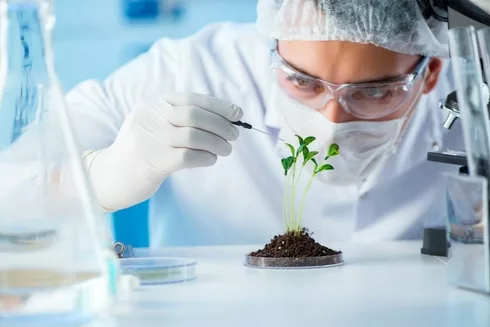Biotechnology is one of the fastest-changing scientific fields. Discoveries in this area could have enormous implications for healthcare, agriculture, and business. These improvements push the boundaries of what is possible and provide answers to some of the most important questions we face today. Biotech innovations such as gene editing and sustainable agriculture not only make people’s lives better but also make the future more sustainable. This article describes the latest findings and how they could impact different fields.
1. Changes in Genes and CRISPR Technology
Gene editing, and especially CRISPR-Cas9 technology, is one of the most important developments in science. Scientists can precisely alter DNA sequences and gene functions using CRISPR, which stands for “clustered regularly spaced short palindromic repeats.” Because it can repair errors at the DNA level, the technology could potentially cure genetic diseases. Targeted gene editing can eradicate diseases such as cystic fibrosis, sickle cell anemia, and muscular dystrophy. In addition to its use in medicine, CRISPR is also used to increase agricultural productivity by making crops more resistant to diseases and pests.
2. Personalized Medicine
Personalized medicine is a new approach to care that tailors care to the unique needs of each patient. This new technology makes extensive use of genetic information to find the best drugs and treatments for each person’s unique genetic makeup. Biotechnology has come a long way and makes it possible to sequence genes quickly and cheaply. This leads to more personalized healthcare solutions. For example, personalized medicine can help oncologists find the best chemotherapy drugs for each patient’s cancer type, significantly improving the effectiveness of treatment. This approach not only makes treatments more effective but also reduces side effects, making healthcare more precise and patient-focused.
3. Medicines and Biological Products
Biopharmaceuticals, also called biological medicines, are medicines made using biotechnology. There are many different things on that list, such as vaccines, blood components, and recombinant pharmaceutical proteins. The birth of biopharmaceuticals was a breakthrough in biotechnology, making it possible to treat diseases that were previously impossible. Monoclonal antibodies are biopharmaceuticals that have transformed the treatment of diseases such as rheumatoid arthritis and certain cancers. These biologics directly target the substance that causes the disease, making treatments more effective and targeted than traditional small-molecule drugs.
4. Regenerative Medicine and Tissue Engineering
Tissue engineering and regenerative medicine are exciting fields of science that seek to repair or replace damaged organs and tissues. The new idea uses stem cells, polymers, and growth factors to restore healthy tissue. Significant advances have been made in this field, such as the creation of artificial organs and the ability to grow tissue in the laboratory for transplantation. Scientists have managed to correctly manipulate the skin, cartilage, and even the heart valves. These advances could help solve the problem of organ donor shortages and provide new treatments for people suffering from long-term illnesses and accidents.
5. Synthetic Biology
Synthetic biology is a branch of biotechnology that studies how living organisms can be modified to possess new skills, making them more useful. Biology, engineering, and computer science are used together in this field to create artificial life forms and biological systems that do not exist in nature. One of the most interesting applications of synthetic biology is the creation of biofuels and bioplastics, which are long-term alternatives to fossil fuels and common plastics. Furthermore, synthetic biology could lead to the development of new ways to treat diseases, such as creating bacteria that can find and kill cancer cells.
6. Agricultural Biotechnology
Agricultural biotechnology uses scientific methods and tools to modify plants and animals so that they are more productive and less likely to become diseased. New ideas in this area are needed to address global food security and support agriculture that does not harm the environment. One of the most well-known components of agricultural biotechnology is genetically modified organisms (GMOs). You can develop these crops so that they have good qualities such as higher yields, resistance to pests, and the ability to cope with natural stresses such as drought. Advances in agricultural biotechnology have also made it possible to grow crops with higher nutritional content. This could help poor countries combat malnutrition.
7. Microbiome Research
The human microbiome, which consists of all microorganisms living on and in humans, is now an important area of biotechnology research. New developments in this field reveal the complex links between the microbiome and health. Learning more about the role of the microbiome in conditions such as obesity, diabetes, and inflammatory bowel disease will enable new ways to diagnose and treat disease. For example, microbiome-based probiotics and therapies are being developed to treat various conditions and restore a healthy microbial mix. Researchers studying the microbiome are also using what they have learned in other fields, such as agriculture, and understanding the soil microbiome can help crops grow better and produce more.
8. Environmental Biotechnology
Environmental biotechnology is the field that studies the production of technologies that help protect and restore polluted environments and dispose of environmental resources in a way that does not harm them. Bioremediation, the use of microorganisms and plants to remove pollution, is one of the newer concepts in this field. For example, some bacteria can break down oil spills, while plants called hyperaccumulators can absorb heavy metals from contaminated soil. These biotechnologies provide environmentally friendly methods for waste management and pollution reduction. Environmental biotechnology is also used to create environmentally friendly agricultural methods such as biofertilizers and biopesticides that use fewer chemicals.
9. Using Biotechnology to Grow Food
Innovative ways of growing food are largely made possible by biotechnology. This includes making laboratory meat, also called cultured meat, which is made by growing animal cells in a controlled environment. Lab-grown meat is an environmentally friendly alternative to raising animals for food and has a major impact on the environment. Biotechnology is also used to make food healthier by adding more nutrients, creating plant-based protein sources, and creating beneficial foods that not only provide nutrients but are also better for your health. These new ideas help meet the growing demand for healthy and environmentally friendly food options.
10. Nanotechnology in Biology
Nanobiotechnology is a new field. It combines nanotechnology and biotechnology to create new nanoscale instruments and applications. Innovations in nanobiotechnology are driving major advances in the way doctors diagnose and treat diseases. Nanoparticles can be used to deliver drugs directly to cancer cells, reducing side effects and making treatments more effective. Nanotechnology is also being used to create more accurate testing instruments, such as nanosensors that can detect diseases early. Nanobiotechnology is not just for medicine. For example, nanomaterials can help protect crops and better supply nutrients for agriculture.
Conclusion
Biotech innovations are making significant progress in many areas, from agriculture and healthcare to food production and environmental management. These improvements not only help solve problems but also open up new opportunities for the future. As biotechnology continues to develop, it has the potential to transform businesses and improve the lives of people around the world. It is important to stay abreast of these new technologies to understand how they impact business and take advantage of their benefits. The future of biotechnology looks bright, with many opportunities to make important breakthroughs and use biotechnology in new and important ways.



